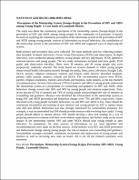| dc.description.abstract | NANYONJO GERTRUDE (2008-M092-30034)
Perceptions of the Mentorship System (Ssenga-Kojja) in the Prevention of HIV and AIDS among Young People: A Case Study of Lyantonde District
The study was about the community perception of the mentorship system (Ssenga-Kojja) in the prevention of HIV and AIDS among young people in the community of Lyantonde. It mainly focused on exploring the community perception of the mentorship system in the prevention of HIV and AIDS among young people, sources of information on sexual behaviour, the contribution of the mentorship system to the prevention of HIV and AIDS and suggested ways of improving the system.
Both primary and secondary data were collected. The main methods used for collecting primary data included: In-depth interviews, Focus Group Discussions (FGDs) and observation. In-depth interviews were conducted among mentors, young people and key informants. FGDs applied to selected mentors and young people. The key study instruments included interview guide, FGD guide, and observation checklist. There were 38 mentors and 48 young people who were purposively, randomly selected. The study found out several channels in which young people obtain sexual health information namely through the media, films, peers, television, Straight Talk, NGOs, parents, religious institution, mentors and schools while mentors identified hospitals, parents, radio stations, mentors, schools and NGOs. The recommended sources were NGOs, parents, religious institution, mentors and schools and hospitals, radio stations, as the top channels of communication. Seventy three percent (73%) of mentors and 44% of young people understood the mentorship system as a programme on counselling and guidance on HIV and AIDS, while behaviour change scored only 56% and 30% by young people and mentors respectively. Sixty seven percent (67%) of mentors and 74% of young people acknowledged the role of mentors as counselling and guidance. Mentors who identified the achievement of the mentorship system as being HIV and AIDS prevention and behaviour change were 73% and 60% respectively. Issues discussed with young people included; behaviour, sex and HIV and AIDS as key. There should be continuous recruitment and training of new mentors and young people by SSF to replace those who died and shifted. Motivation was also strongly mentioned for sustainability purposes. For example, it was recommended that SSF should provide mentors with revolving loan capital. Young people should adhere to mentor advice; SSF should develop a clear exit strategy as a way of preparing mentors to continue with their work without expectations, and further study on the actual impact of the mentorship system. SSF and other NGOs should train young people as peer educators. In summation, the main sources of information on sex were identified and recommendations were made on the best sources. Achievements were HIV and AIDS prevention and behavioural change among young people, the role of mentors was counselling and guidance. Sustainability strategies included: continuous recruitment and replacement of young people and mentors as well as recruiting new ones on board. All in all, all the research questions were answered.
Key Words: Perceptions, Mentorship System (Ssenga-Kojja), Prevention, HIV/AIDS, Young People, Lyantonde District. | en_US |


